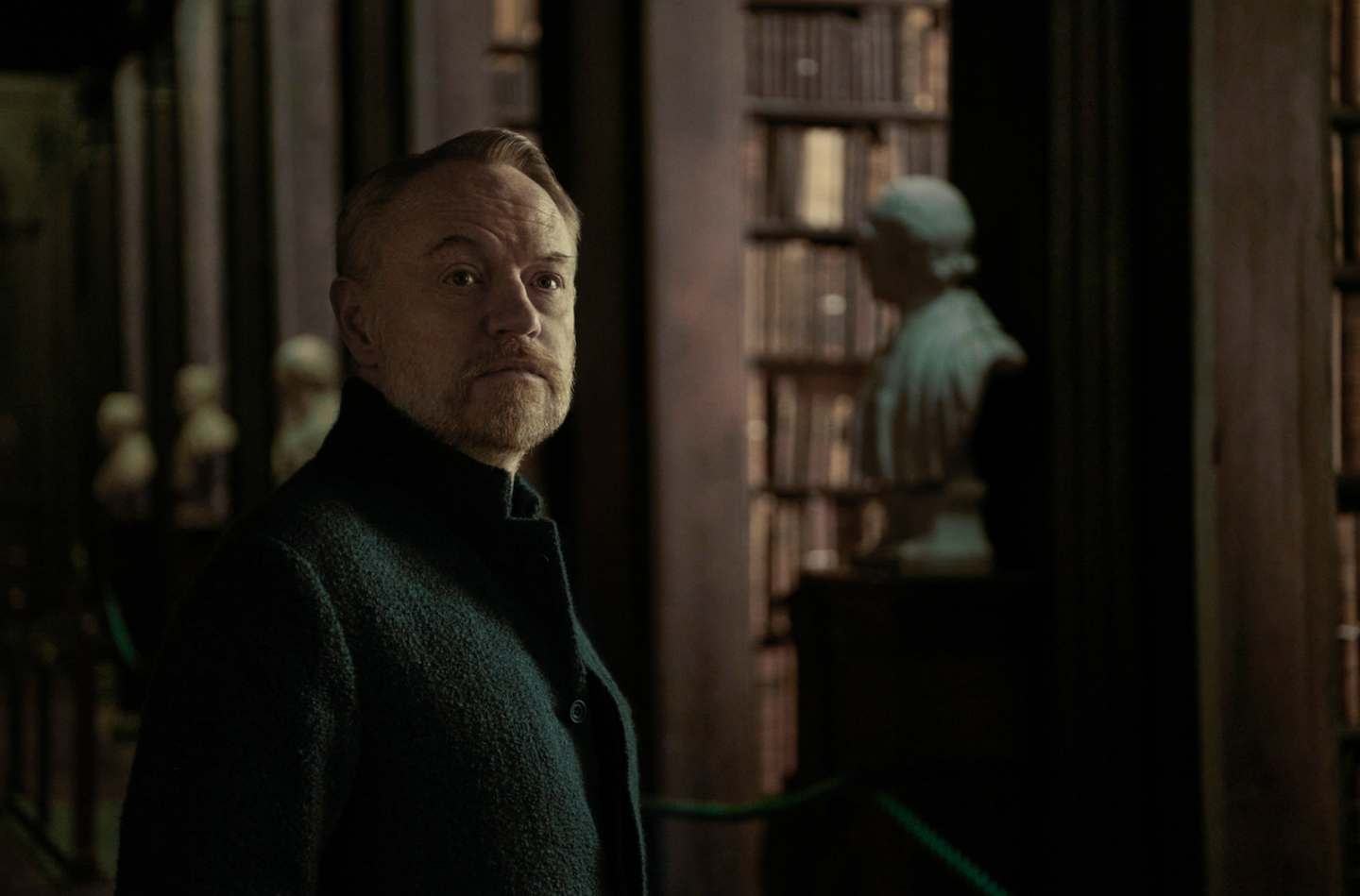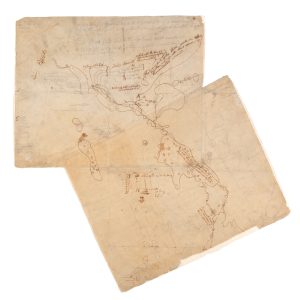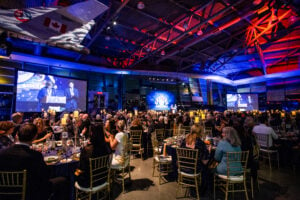
People & Culture
Kahkiihtwaam ee-pee-kiiweehtataahk: Bringing it back home again
The story of how a critically endangered Indigenous language can be saved
- 6310 words
- 26 minutes
People & Culture
Ahead of the series finale, we caught up with Louie Kamookak Medal recipient Jared Harris to discuss his role as Hari Seldon on Apple TV+’s hit new series Foundation

Apple dropped a new series this fall starring RCGS medal recipient Jared Harris.
Set in the expansive universe created by biochemistry professor and pioneering sci-fi author Isaac Asimov and streaming on Apple TV+, Foundation unfolds the story of a Galactic Empire’s struggle for survival and relevance after a mathematician, Hari Seldon (played by Harris), predicts its inevitable downfall.
Reimagined by veteran filmmaker and showrunner David S. Goyer, Foundation follows Seldon and a cast of fascinating characters as they work to establish a distant colony to preserve all of humanity’s knowledge. On the other side of the struggle are the Cleons, a genetic dynasty of three rulers created in the image of their distant relative Cleon I. Lee Pace, who co-stars alongside Harris as Brother Day, explains, “[The Cleons] have got absolute control over the entire Milky Way galaxy. They decide who lives and who dies. They decide who prospers and who suffers. They believe that they are the same man that has lived for 400 years — and has established a balance and prosperity for the galaxy, which will last forever. But all of these things are a fantasy. The personal journey these three men go on is really kicked off by Hari Seldon’s predictions.”
Harris’ Seldon is the guiding voice throughout the entire show, which turns out to be as epic as the award-winning series of novels which inspired it. We caught up with Harris during a press day for Foundation to learn more about his pivotal role in Apple’s next big franchise.
CG: You have clearly got a knack for taking on characters deeply involved in exploration, whether travelling the Northwest Passage in The Terror or pushing through the Chernobyl investigation. Foundation is such a surreal comparison, with its genetic dynasty and interplanetary travel. What really drew you to the series?
Harris: I’m a fan of sci-fi. I love the the opportunity that it gives you to be superficially, nakedly entertained. You can take people on this sort of rollicking adventure — this epic journey, if you like. At the same time, all good sci-fii has the ability to reflect the times that it lives in, so I find that immediately appealing. I saw right away that David was taking some big swings at some big ideas — Hari Seldon included. There’s a big legacy to the character, you know. He casts a big shadow over the entire series of the novels — and not quite as he does in our series.
CG: An epic story that spans seven novels, Foundation has been central to the evolution of modern science fiction — inspiring the likes of Star Wars and beyond — but many people have not actually read the series. Had you been exposed to the books prior to signing on?
Harris: I am one of those people who did not know about it. I read the books after I signed on, [by which point] I had already read the first two episodes. Then I went back and read the books up to where our story starts. I quickly understood why it had been such a challenge — for so many decades — to figure out how to tell a story that is so philosophical in nature. Some of the conversations in the books go on for 20 or 30 pages and are not inherently dramatic. A lot of the drama you hear about is something that occurred elsewhere, so they report an event that’s happened, but [Asimov] doesn’t put you in the position of seeing and witnessing it firsthand. When I read the script, I was really impressed by the way David S. Goyer had solved that problem, that he had found a way to stay true to the philosophical spirit of Asimov’s books, and his musings, while finding a way to make it accessible, and a bit dramatic as well.
CG: With some massive, important roles under your belt, stepping into the character of a fictional psychohistorian and master scientist like Hari Seldon must have seemed less daunting. How did you prepare?
Harris: My thought process was to go and investigate the lives of scientists who made giant discoveries and breakthroughs [in the time that Asimov was writing]. I quickly realized that if you’ve done something like that, you’ve got a big ego and you are rather aware that you are smart. You know, some of them are difficult to live with. You hear about their behavioural issues. The biggest challenge for me with Hari, as he appeared in his first two episodes, was I didn’t want him just to be a mouthpiece for his theories or predictions. There had to be more to him than that. If he was some sort of giant static academic, I wasn’t interested. He needed to be a fully fleshed-out human being, and we had to allow the character to have that impact and that possibility, and presence.
CG: With a character who reads sterile, where did you find inspiration for his humanity?
Harris: There was a concern in the beginning: This character knows everything. Seldon knows the outcome of the story. So this caused further concern about wanting to have him play his cards closer to his chest. But, you know, that’s a difficult thing to play. One of the things that came to mind, for me, was Robert Downey Jr.’s performance as Sherlock Holmes. Now, Sherlock knows the last five minutes of the story when the movie begins — and the challenge that he talked about was, how do you keep that character alive? It was interesting to me because then you realize that you have to create a vulnerability for the character. You have to introduce the idea that there is uncertainty. You don’t know what’s going to happen. You can’t predict all the events; you can have a good educated guess, but there needs to be the idea that it could take off in different directions.
CG: In closing, do you have any words of wisdom for Foundation fanatics?
Harris: If you are willing to take the journey, it is an an epic journey. Like the books, [the series] takes a swing at some very big, ambitious ideas and themes. Everyone always says, “Well, you know, it wasn’t as good as the books.” But if they allow themselves to take this journey, I think they will be pleasantly surprised.
Are you passionate about Canadian geography?
You can support Canadian Geographic in 3 ways:

People & Culture
The story of how a critically endangered Indigenous language can be saved

Environment
Struggle and success in Atlantic Canada, where aquaculturists strive to overcome climate change and contamination while chasing a sustainable carbon footprint

People & Culture
*It means “awake” in Beothuk, the language and people who once called present-day Newfoundland home for about 2,000 years. One young woman, believed to be the last living Beothuk, left a collection of maps and art that help us understand her people’s story.

People & Culture
Celebrating iconic collaborations, exciting partnerships, a new RCGS president and many more memorable moments from the 93rd College of Fellows Annual Dinner